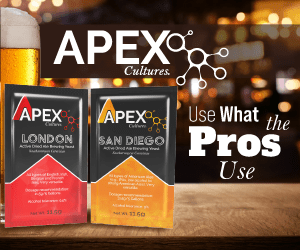Recipe Creation
TroubleShooting
Michael Schrotenboer - Kalamazoo, Michigan asks,
What are the biggest considerations that i should take into account when crafting my own homebrew recipes?
Developing new recipes is really one of my favorite things about brewing and I have some fairly strong opinions about this topic. Before I begin with my answer I think it is important to state that there are a few schools of thought about recipe development and that my method and general belief is certainly not shared by all brewers.
The most important target to nail in my view is the original gravity (OG) and I believe that learning how to perform brewing calculations is a prerequisite to recipe development. When I say nailing gravity, this also includes wort volume. So if the goal is to produce 5 gallons (19 L) of wort at 1.048 (12 °Plato), I want 5 gallons (19 L) +/- ~2.5% at 12 °Plato +/- 0.1 °Plato. My reasoning is that OG largely determines alcohol content and influences body and wort volume affects bitterness since hopping is based on batch size. If you miss your volume target you also miss your bitterness target. So job #1 is knowing how to nail those brewing targets.
When I am formulating a recipe I absolutely must have a very clear idea of the finished beer. Some brewers “add a pinch of this and a pinch of that” like a grazer at a salad bar. This method of recipe development is completely foreign to me. I begin with an idea of the beer and build my recipe and brewing process to support the pint that is in my mind’s eye. Since nailing targets is a given in my method of recipe development, the real job #1 is to have a goal in mind.
I think developing the goal is often a major part of the fun and challenge that comes with recipe development. This process includes tasting beer, imagining flavor modifications to the beers being tasted, researching styles, ingredients, recipes published by other brewers and tweaking the flavor of the beer being developed before actually brewing the beer. The thing most consumers don’t understand about brewing is that once a recipe is formulated and the wort is made, brewers still have weeks to wait until we know if our creation matches the plan. While there are some oppor-tunities to tweak a batch after brew day, most of the key attributes of the beer have been determined very early in the process. This is why my particular method involves lots of what I call abstraction, where I zone off into my thoughts and transform ingredients and processes into a finished beer.
In order for this process to actually work, you need to have a fair amount of experience that only comes with time. Every time you develop a new recipe you need to somehow fold the process into your mental collection of brewing ideas. Every time you learn something about a beer you taste, this too needs to be added to your mental brewing library.
Once the general goal has been defined and a working recipe is in place I really focus on a few key things before considering the recipe ready to brew. The two biggies to me are balance and drinkability. No matter the style of beer I am contemplating I want a beer that has these two properties. Balance allows all of the ingredients and techniques to be expressed. And if all turned out well the thing I personally prize the most in a beer is drinkability. This is the trait that makes you want another sip and is one of the hallmarks separating the great from the good.

